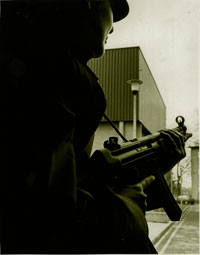29 March 2007 Edition
Ombudsman Report : Attempted rebuttal by former Special Branch members

Fallot continues over collusion report
BY LAURA FRIEL
The fallout following the publication of the Ombudsman’s report into Special Branch collusion with unionist paramilitaries in North Belfast continued last week with a rearguard action by former senior members of Special Branch and the publication of a rebuttal, “How the Police Ombudsman Got it Wrong!”
In a detailed reply to O’Loan’s report, former leading members of Special Branch attempted a root and branch deconstruction of the Ombudsman’s case. Clearly rattled, not only by the report itself, but also the media response to O’Loan’s findings, the rebuttal fine tooth combs the detail, contesting the language, highlighting underlining premises and questioning the status of the evidence presented.
According to the rebuttal, O’Loan’s statement amounted to a “gross injustice” in which “police officers who have served their country and community with integrity and bravery have been vilified in the court of public opinion”.
“The [Ombudsman’s] statement itself is a chaotic mix of errors of fact and judgement, contradictions, illogical conclusions and innuendo,” complained former Special Branch members.
The rebuttal accuses O’Loan of deliberately crafting the investigation to suit a predetermined conclusion. “It is little wonder that the outcome has been such a shambles,” says the author.
The rebuttal relies on four main points to undermine the Ombudsman’s report. It is alleged that the investigating team were inexperienced and didn’t know how to frame the investigation properly.
“The investigation consisted of the wrong people asking the wrong questions of, largely, the wrong people.”
The rebuttal rejects the Ombudsman’s “lack of co-operation” criticism of former senior officers, suggesting that, by their own evaluation, the high status, secret nature of their work barred them from participating “informally” as O’Loan had initially suggested. In other words it was their professional duty to refuse to engage with O’Loan’s team.
The rebuttal also questions the status of the evidence presented by O’Loan and finally rejects the notion of collusion deployed in the analysis.
Of course all this huffing and puffing only serves to confirm the view that the arrogant high regard with which Special Branch held itself rendered officers to believe they were above reproach. Special Branch was not only unaccountable, it believed it had a right, even a duty to be so.
In other words Special Branch really believe they are “special” and that somehow they operate outside the remit of the ordinary. During the Ombudsman’s Omagh investigation the then Chief Constable and former head of Special Branch Ronnie Flanagan had clashed with O’Loan but O’Loan “had not learnt her lesson,” complains the rebuttal.
Ironically Special Branch, the very people who were instrumental in down grading the nature of evidence required to secure thousands of unsafe convictions, are now outraged that, what they claim to be unsubstantiated allegation, is now being deployed against their reputation.
The key complaint in the rebuttal is the inadequacy of the notion of collusion deployed by the Ombudsman. And they are right. But while Special Branch complains O’Loan’s notion of collusion assumes too much, republicans would argue that it acknowledges too little.
At its core O’Loan’s notion of collusion is passive, failure to prevent, failure to investigate, failure to convict are the cornerstones of her findings but she goes significantly further to detail systematic cover up. Special Branch ignored evidence, destroyed evidence, fabricated statements, conducted sham interviews, withheld information, blocked investigations and cancelled the wanted status of suspects.
O’Loan suggests Special Branch handlers were prepared to go to unacceptable lengths to maintain and protect their informants and this sometimes resulted in crimes being committed by agents despite the prior knowledge of Special Branch officers.
All this is a far cry from republican understanding of collusion as a specific British policy that involved the establishment of specific agencies, including Special Branch and FRU, and specific chains of command, involving MI5 and the British Cabinet.
Through these mechanisms the British state organised, armed and directed unionist paramilitary gangs as part of a counter insurgency war not just against the IRA but against the Irish people, anyone on the island of Ireland, republicans, unionists, Catholic and Protestant. A war in which British interests were paramount and Irish lives cheap.
The significance of O’Loan’s report goes beyond anything contested in the rebuttal by former members of Special Branch for two very important reasons. First, of those who had been the most sceptical in relation to allegations of collusion, the unionist community, the vast majority now accepted collusion as a matter of established fact.
According to the Newsletter over 70% of their readership believed O’Loan to be right. This emerged less as a consequence of the report itself and more in the fact that O’Loan’s account of Special Branch handlers’ relationship with their agents confirmed the lived experience of unionist communities where unionist paramilitaries had been allowed to run amok.
The second most important reason is that the popular perception of collusion has changed. O’Loan’s findings are being judged within a different framework of understanding, an understanding within which Special Branch, and the other agencies of collusion, can exercise less control. The court of public opinion has indeed moved on.



